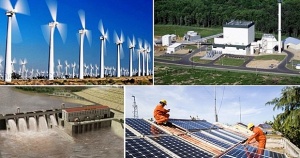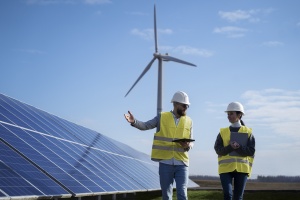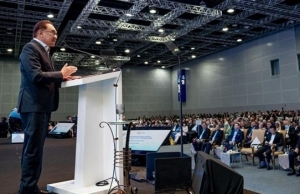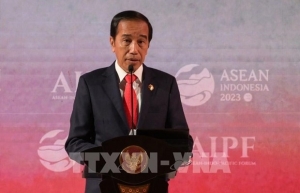US coordination plays vital role in energy revolution
You have just made a visit to Indonesia and the Philippines for ASEAN meetings on energy and US exchanges. What are the US’ efforts in the energy transition for the region?
 |
| David M. Turk, Deputy Secretary for the US Department of Energy |
We concluded talks with our ASEAN minister colleagues and had a meeting with a number of the ministers for bilateral discussions. In addition, I had a chance not too long ago to visit Thailand and Vietnam as well.
We view a core part of our overall efforts to engage in partnership with key organisations like ASEAN with its incredible impact. And we have a number of ongoing areas of collaboration with every member countries and ASEAN as a group.
We are working on a just energy transition partnership with Indonesia and Vietnam. We have our flagship partnership at the Department of Energy called Net-Zero World, where try to bring terrific, independent, gold-standard technical expertise from our national laboratories to help ASEAN countries, and to inform policymaking and decision-making as we make progress in the US.
There are incredibly fruitful and real-world conversations on that front, and we strive to be a true partner for countries around the world and in ASEAN.
We are also having a range of conversations on clean energy supply chains and trying to work with countries so that they benefit not only from the mining of their particular minerals and resources but also move up the value chain so that they get more economic benefit from those resources that they have been given.
We view that as a win for those countries and those people, assuming the mining and the manufacturing are done responsibly, but also a win for the diversification of supply chains and making sure that we all can benefit from these technologies going forward.
What are the obstacles that some Southeast Asian countries face on the way to attaining net-zero by 2050?
The greatest obstacle for Southeast Asian countries is in line with what science is telling us to avoid even worse consequences of climate change. And all our countries are already experiencing horrific consequences of climate change like droughts, extended heat spells, and all sorts of more violent typhoons and hurricanes.
The most difficult obstacle is just the scale and pace of what we need to do: transforming the whole economies in electricity, transportation, manufacturing, and building towards becoming truly net-zero within just a few decades. It is a huge undertaking, and we are all part of this transition. We all need to support and push each other, and to have guidelines and incentives for the private sector to really take off and get it. Then there are particular obstacles underneath.
For Southeast Asian countries to achieve net-zero targets, we work with them to support their own objectives, especially those with ambitious targets. It is leveraging our phenomenal national lab expertise in the US that is helping us on our own transition by useful expertise and sharing.
We have heard about some opportunities and potential for different technologies. We had good conversations on offshore wind – 170GW of offshore wind potential has been estimated just in the Philippines itself, and there is also huge offshore wind potential in Vietnam and other countries in the region, in addition to geothermal, solar, and floating solar. Working on the grids and building out transmission is a shared challenge.
How do you see the role of Asian countries in driving the growth of the hydrogen energy industry in the US?
The subjects of hydrogen and clean hydrogen come up in every international meeting that I have gone to recently and we are certainly trying to help move along a clean hydrogen economy, not only for the benefit of the US but of countries around the world.
In the US, we have a very robust set of incentives to try to move our clean hydrogen economy along. One of our most generous tax incentives through the Inflation Reduction Act – up to $3 per kg for hydrogen production, a production tax credit – is in place and we are putting together the final rules of that particular tax credit.
The Department of Energy also coordinates $8 billion directly into hydrogen hubs to take advantage of existing hydrogen but not clean hydrogen, and industrial clusters to try to build out the hydrogen economy in a very cost-effective kind of way. There is a role for the US government and companies to help support other goals on hydrogen in the ASEAN countries but the region as a whole, and vice versa as well.
We have many relevant partnerships and there is a great interest in international trade in clean hydrogen. There is a role for all of us trying to move this along, especially for hydrogen being able to help us decarbonise harder-to-decarbonise so-called sectors, like a variety of industries, and heavy-duty freight, where hydrogen holds some potential in.
 | $15.5 billion in financing for green energy from Just Energy Transition Partnership 2023 could be an interesting year for Vietnam’s energy sector, as $15.5 billion of financing is set to be mobilised for Vietnam’s green energy transition through a recent energy partnership. |
 | ASEAN needs 29.4 trillion USD for energy transition to renewables Indonesian Energy Minister Arifin Tasrif has said that ASEAN countries need accessible low-carbon technologies and low-interest financing from multiple sources to achieve their net-zero targets. |
 | Vietnam's 15 renewable energy transition projects generate 154 million kWh In a significant stride towards renewable energy adoption, 15 transitional renewable energy projects have contributed approximately 154 million kilowatt-hours (kWh) of electricity. |
 | Malaysia to allocate 430 million USD for energy transition Malaysia will allocate 2 billion ringgit (430 million USD) to a National Energy Transition Facility to enable catalytic blended finance, Prime Minister Anwar Ibrahim announced on August 29. |
 | ASEAN needs 29.4 trillion USD for energy transition ASEAN member countries need 29.4 trillion USD for energy transition process, Indonesian President Joko Widodo has said. |
What the stars mean:
★ Poor ★ ★ Promising ★★★ Good ★★★★ Very good ★★★★★ Exceptional
Related Contents
Latest News
More News
- Bac Ai Pumped Storage Hydropower Plant to enter peak construction phase (January 27, 2026 | 08:00)
- ASEAN could scale up sustainable aviation fuel by 2050 (January 24, 2026 | 10:19)
- 64,000 hectares of sea allocated for offshore wind surveys (January 22, 2026 | 20:23)
- EVN secures financing for Quang Trach II LNG power plant (January 17, 2026 | 15:55)
- PC1 teams up with DENZAI on regional wind projects (January 16, 2026 | 21:18)
- Innovation and ESG practices drive green transition in the digital era (January 16, 2026 | 16:51)
- Bac Ai hydropower works stay on track despite holiday period (January 16, 2026 | 16:19)
- Fugro extends MoU with PTSC G&S to support offshore wind growth (January 14, 2026 | 15:59)
- Pacifico Energy starts commercial operations at Sunpro Wind Farm in Mekong Delta (January 12, 2026 | 14:01)
- Honda launches electric two-wheeler, expands charging infrastructure (January 12, 2026 | 14:00)

 Tag:
Tag:


















 Mobile Version
Mobile Version